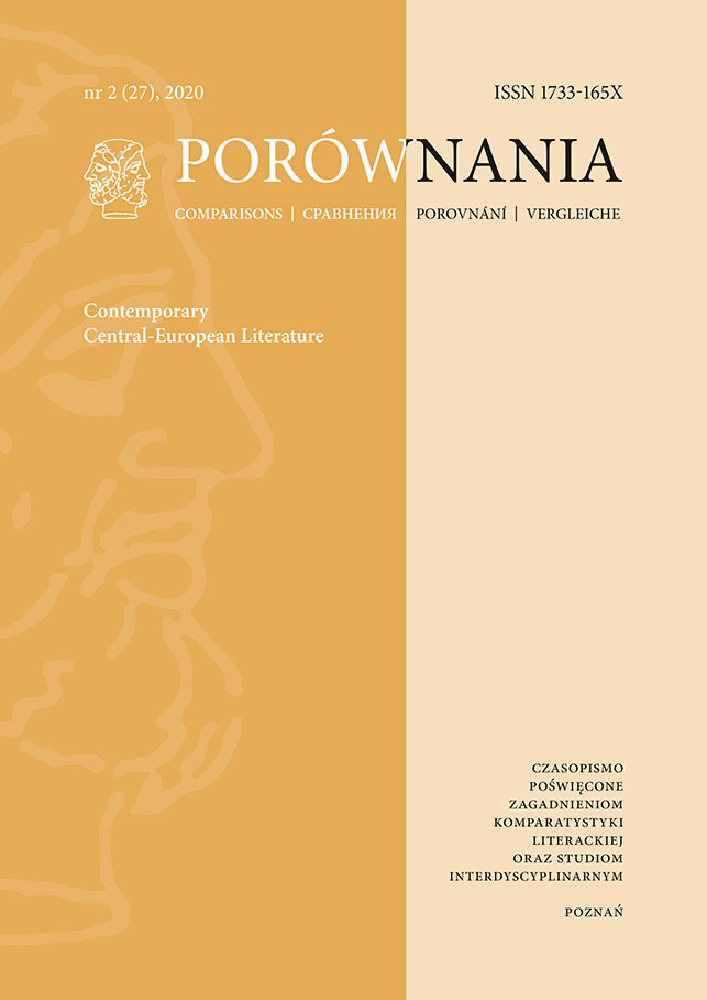Abstract
In the course of the past three decades, marked in post-communist Central European countries by their sudden repositioning on the geopolitical map, Slovak social and cultural spaces, in great haste and chaos, got to locale-specific grips with postmodernism and, more or less simultaneously, entered contemporaneity. The leap to the present has created inherently transcultural modes of existence, in which global news, fashions and tastes form a relevant part of individuals’ identities. Through the prism of Peter Osborne’s (2013, 2018) concept of historical contemporaneity, this essay briefly outlines modifications that the segment of Slovak poetry marked by Osbornian contemporaneity has undergone in the past three decades.
References
Andreasi, Carlo. “Border is not a line but a depth.” Place: Relinking, Relating, Relaying. 2018, https://tinyurl.com/yxve88sn. Accessed 8 February 2019.
Bernstein, Charles. Content’s Dream. Evanston, Ill.: Northwestern University Press, 2001.
Casanova, Pascale. The World Republic of Letters. Trans. by M. B. Debevoise. Cambridge, Mass. and London: Harvard University Press, 2007.
Ďurišin, Dionýz. Theory of Literary Comparatistics. Trans. Jessie Kocmanová. Bratislava: VEDA, 1984.
Habaj Michal, Belková Zuzana. “Neviditeľná cestička úteku.” Kultúrny život 42 (2001): 4–5.
Hanson, Louise. “Is Concrete Poetry Literature?” Midwest Studies in Philosophy XXXIII (2009): 78–106.
Huebener, Paul et al. “Exploring the Intersection of Time and Globalization.” Globalizations 13.3 (2015): 243–255.
Husárová, Zuzana. “Slovenská elektronická literatúra.” World Literature Studies 8.3 (2016): 57–77.
Kucbelová, Katarína. “A Greenhouse Poem.” Trans. Ivana Hostová. Poem 4.2 (2016): 269.
Lebel, Sabine. “Fast Machines, Slow Violence: ICTs, Planned Obsolescence, and E-waste.” Globalizations 13.3 (2015): 1–10.
Lefevere, André. Translation, Rewriting and the Manipulation of Literary Fame. London and New York: Routledge, 1992.
Mlynárčiková, Marianna – Ružičková, Nóra. <–abc–>. Kordíky: Skalná ruža, 2018.
Moretti, Franco. “Conjuctures on World Literature.” New Left Review 1 (2000): 54–68.
Osborne, Peter. The Postconceptual Condition. London and New York: Verso Books, 2018.
Osborne, Peter. Anywhere or Not at All. London: Verso Books, 2013.
Peková, Olga. “Intermedia & the posthuman.” VLAK 4 (2012): 388–391.
Perloff, Marjorie. Radical Artifice. Chicago: University of Chicago Press, 1994.
Robinson, Douglas. “What kind of literature is a literary translation?” Target 29.3 (2017): 440–463.
Rosa, Hartmut. “Social Acceleration: Ethical and Political Consequences of a Desynchronized High–Speed Society.” Article in Constellations 10.1 (2003): 3–33.
Skrebowski, Luke. “Approaching the Contemporary. On (Post-)Conceptual Writing.” Amodern 6 (2016), https://tinyurl.com/y6zddxe8. Accessed 8 February 2019.
Šrank, Jaroslav. “Poéme fatal (text generation-zvodcovia zmyslu).” Romboid 35.6 (2000): 19–30.
Šrank, Jaroslav. Individualizovaná literatúra. Bratislava: Cathedra, 2013.
Šrank, Jaroslav. Aktéri a tendencie literárnej kultúry na Slovensku po roku 1989. Bratislava: Univerzita Komenského, 2015.
Šrank, Jaroslav. “Field Notes: New Developments in Slovakian Poetry.” Trans. Lena Dorn
and Max Oravin. Samplekanon. 2015, https://samplekanon.com/p3238. Accessed 7 March 2019.
Zajac, Peter. “Prelomové či svoje?” OS 1 (1999): 74–77.
Želinský, Dominik. “Dve tváre novej generácie.” Kapitál 3.2 (2019): 26–27.
License
Utwory opublikowane w czasopiśmie „Porównania”, na platformie Pressto należącej do Uniwersytetu im. Adama Mickiewicza w Poznaniu są udostępniane na licencji Creative Commons Uznanie autorstwa - Bez utworów zależnych 4.0 Międzynarodowe (CC BY-ND 4.0)
Tym samym wszyscy zainteresowani są uprawnieni do korzystania z utworów opublikowanych pod następującymi warunkami:
-
uznania autorstwa — czyli obowiązek podania wraz z rozpowszechnianym utworem informacji o autorstwie, tytule, źródle (odnośniki do oryginalnego utworu, doi) oraz samej licencji
-
bez utworów zależnych — remiksując, przetwarzając lub tworząc na podstawie utworu, nie wolno rozpowszechniać zmodyfikowanych treści.
-
brak dodatkowych ograniczeń — nie można korzystać ze środków prawnych lub technologicznych, które ograniczają innych w korzystaniu z utworu na warunkach określonych w licencji.
Uniwersytet im. Adama Mickiewicza w Poznaniu zachowuje prawo do czasopisma jako całości (układ, forma graficzna, tytuł, projekt okładki, logo itp.).
Autor zachowuje prawa majątkowe, ale udziela zgody Uniwersytetowi im. Adama Mickiewicza w Poznaniu na wykorzystanie dzieła. Autorzy tekstów zakwalifikowanych do publikacji proszeni są o wypełnienie podpisanie i przesłanie umowa (PL) agreement (EN)
Agreement for granting a royalty-free license to works with a commitment to grant a CC sub-license




